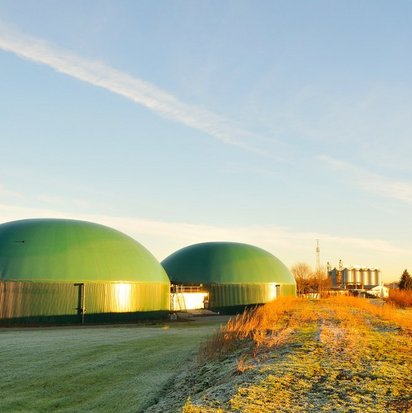Biogas production, construction, commissioning


The test content and the inspection documentation that accompanies the report are coordinated with the relevant authorities and are recognised by them. So you can use our report as proof of safety for official bodies, professional associations, insurance companies and investors.
The majority of the legal framework lies in different areas of law. The following are, in short, the safety checks required in a biogas plant.
A biogas plant is considered to require monitoring in accordance with BetrSichV. This can include biogas plants in potentially explosive atmospheres and pressurised equipment.
The Ordinance on Industrial Safety and Health forms the legal basis for carrying out the necessary inspections on a plant that requires monitoring. In this way, the operator ensures safety for his employees and third parties and avoids potential risks. Systems requiring monitoring must be inspected for compliance with safety standards prior to initial commissioning or after a modification requiring inspection in accordance with Section 15 BetrSichV. The recurring inspection of systems in potentially explosive atmospheres (Section 16 BetrSichV) must then be carried out at least every three years.
A biogas plant is considered hazardous under the German Workplace Safety Ordinance. This means that biogas plants count as potentially explosive areas, together with pressure equipment.
The Ordinance on Industrial Safety and Health is the legal basis for carrying out the necessary checks on a plant that requires monitoring. This helps the operator provide a safe working environment for his employees and third parties, avoiding potential risks. Plants requiring monitoring must be checked for compliance with safety standards before being put into operation for the first time or after a change that requires inspection according to § 15 BetrSichV Subsequently, the periodic inspection of plants in hazardous areas (§ 16 BetrSichV) must take place at intervals of not more than three years.
In order to guarantee the comprehensive safety of plants and the environment, biogas plants must be designed and operated in such a way that substances hazardous to water cannot escape. This requires, among other things, leakage detection on tanks and pipework. In biogas plants, heating oil, diesel, lubricating oil/used oil, liquid manure, silage slurry (JGS) and in some cases substrates can be categorised as substances hazardous to water. TÜV NORD is a guarantor of the highest safety standards and inspects sites, substrate tanks, pipelines, lubricating oil, waste oil and silage storage facilities, among other things, in accordance with the Ordinance on Installations for the Handling of Substances Hazardous to Water (VAwS).
Biogas plants above a certain size are subject to authorisation with regard to the storage capacity and / or the power of the engine used. According to the Federal Immission Control Act (in §29a BlmSchG), an operator of a plant requiring authorisation can be requested by the authorities to have certain safety inspections carried out on plants as well as inspections of safety-related documents by notified experts.
We undertake the comprehensive inspection ( § 29a BlmSchG ) for the following areas: